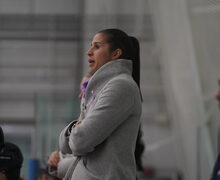Miner, Mahoney cross party lines, discuss gender equality in politics
Spencer Bodian | Contributing Photographer
Syracuse Mayor Stephanie Miner (left) and Professor of Political Science Kristi Andersen at the discussion sponsored by the Maxwell Women’s Caucus Wednesday night in Crouse-Hinds Hall.
Syracuse Mayor Stephanie Miner and Onondaga County Executive Joanie Mahoney went beyond party lines on Wednesday night and came together in support of female political empowerment in politics
Miner, a Democrat, and Mahoney, a Republican, were part of a discussion sponsored by the Maxwell Women’s Caucus in Crouse-Hinds Hall titled “When the Rubber Hits the Road: Public Service from the Woman’s Perspective.”
Both are the first women to hold their respective positions, and with their extensive experience, both reflected on common struggles in what they described as a still very male-dominated world. Miner and Mahoney also discussed how society needs to help empower the new generation to overcome stereotypical gender barriers.
Moderator for the evening, Maxwell School of Citizenship and Public Affairs’ Kristi Andersen, professor of political science, opened the discussion with a basic question: “How does it feel to be the first woman in your position?”
“I have no idea. I have always been a female; I haven’t always been a mayor,” Miner said.
Both Miner and Mahoney said they do not like to think about their gender as a novelty, but prefer to take their gender out of the equation and just take pride in their accomplishments as people.
Being raised in a household that emphasized gender equality, Miner said that when she took office she was embarrassed to learn how blatantly different the measure of equality was in the political spectrum compared to the private sector.
“It is shocking how much we still have to do to be where we need to be,” Mahoney said in agreement. “I am just the same as the men.”
Traditional gender roles still weigh heavily on women in politics, both women explained.
“Women are put into boxes,” Mahoney said. “We are expected to play both gender roles and are heavily criticized when we play too deeply to either gender stereotype.”
For Miner, it was very evident early on that she was not accepted as “one of the guys,” she said.
Miner said that during her time as mayor she was often spoken poorly of because she was a woman, not because of her policies. The name calling has only gotten worse since the Internet age because of the ambiguity of comment pages online, she said.
Andersen next asked the guest speakers what they think can be done to reverse these gender roles, and how women can gain more professional representation within the government. Currently only 18 percent of seats in government belong to women.
“We raise children, then go into politics. That’s the norm for any woman in politics and the window of opportunity for us shrinks considerably because of it,” Miner said.
Mahoney further explained that the infrastructure for women to get elected is lacking in funds. There is no way to raise money quickly for women just starting out in the political field.
Despite the work still ahead for women in American politics, Miner and Mahoney both said they have high hopes for the future.
Kate McNeely, a master’s student in Maxwell’s Public Administration program aspiring toward a career in the public sector, left the discussion feeling empowered. She said she was greatly impressed by the obvious respect the two women showed each other.
“The respect was palpable,” she said. “I want Congress to learn from these two women. They complimented each other and did nothing to bring up party divide.”
Miner and Mahoney closed the discussion by expressing their passion for politics and encouraged all present to engage in government, whether on a local or national level.
Said Miner: “I think it is the natural progression of civilization and we will rise.”
Published on November 29, 2012 at 1:02 am
Contact Erin: erkelly@syr.edu





